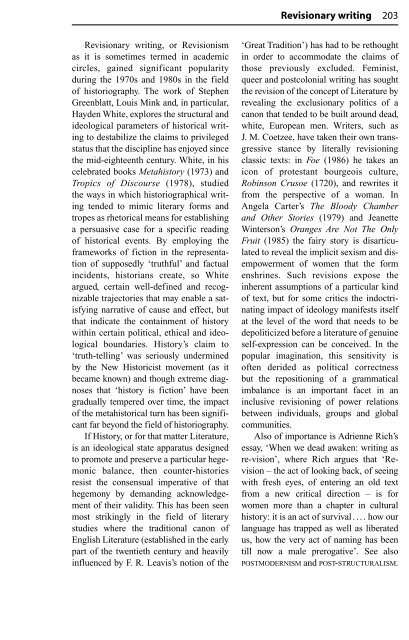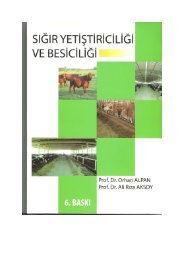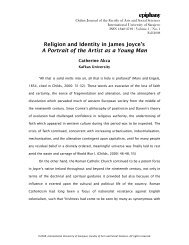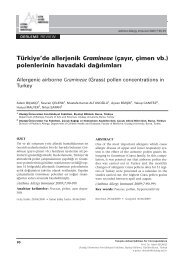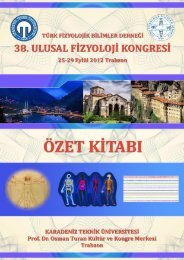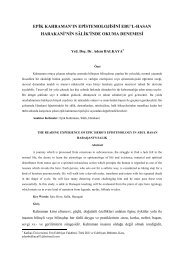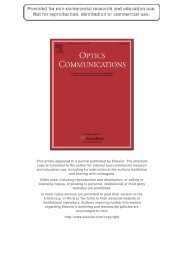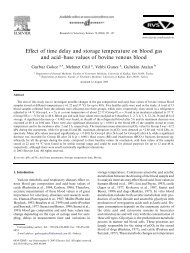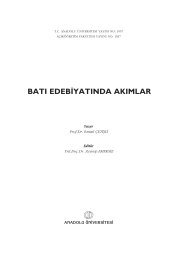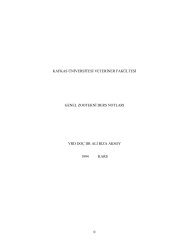The Routledge Dictionary of Literary Terms
The Routledge Dictionary of Literary Terms
The Routledge Dictionary of Literary Terms
Create successful ePaper yourself
Turn your PDF publications into a flip-book with our unique Google optimized e-Paper software.
Revisionary writing, or Revisionism<br />
as it is sometimes termed in academic<br />
circles, gained significant popularity<br />
during the 1970s and 1980s in the field<br />
<strong>of</strong> historiography. <strong>The</strong> work <strong>of</strong> Stephen<br />
Greenblatt, Louis Mink and, in particular,<br />
Hayden White, explores the structural and<br />
ideological parameters <strong>of</strong> historical writing<br />
to destabilize the claims to privileged<br />
status that the discipline has enjoyed since<br />
the mid-eighteenth century. White, in his<br />
celebrated books Metahistory (1973) and<br />
Tropics <strong>of</strong> Discourse (1978), studied<br />
the ways in which historiographical writing<br />
tended to mimic literary forms and<br />
tropes as rhetorical means for establishing<br />
a persuasive case for a specific reading<br />
<strong>of</strong> historical events. By employing the<br />
frameworks <strong>of</strong> fiction in the representation<br />
<strong>of</strong> supposedly ‘truthful’ and factual<br />
incidents, historians create, so White<br />
argued, certain well-defined and recognizable<br />
trajectories that may enable a satisfying<br />
narrative <strong>of</strong> cause and effect, but<br />
that indicate the containment <strong>of</strong> history<br />
within certain political, ethical and ideological<br />
boundaries. History’s claim to<br />
‘truth-telling’ was seriously undermined<br />
by the New Historicist movement (as it<br />
became known) and though extreme diagnoses<br />
that ‘history is fiction’ have been<br />
gradually tempered over time, the impact<br />
<strong>of</strong> the metahistorical turn has been significant<br />
far beyond the field <strong>of</strong> historiography.<br />
If History, or for that matter Literature,<br />
is an ideological state apparatus designed<br />
to promote and preserve a particular hegemonic<br />
balance, then counter-histories<br />
resist the consensual imperative <strong>of</strong> that<br />
hegemony by demanding acknowledgement<br />
<strong>of</strong> their validity. This has been seen<br />
most strikingly in the field <strong>of</strong> literary<br />
studies where the traditional canon <strong>of</strong><br />
English Literature (established in the early<br />
part <strong>of</strong> the twentieth century and heavily<br />
influenced by F. R. Leavis’s notion <strong>of</strong> the<br />
Revisionary writing 203<br />
‘Great Tradition’) has had to be rethought<br />
in order to accommodate the claims <strong>of</strong><br />
those previously excluded. Feminist,<br />
queer and postcolonial writing has sought<br />
the revision <strong>of</strong> the concept <strong>of</strong> Literature by<br />
revealing the exclusionary politics <strong>of</strong> a<br />
canon that tended to be built around dead,<br />
white, European men. Writers, such as<br />
J. M. Coetzee, have taken their own transgressive<br />
stance by literally revisioning<br />
classic texts: in Foe (1986) he takes an<br />
icon <strong>of</strong> protestant bourgeois culture,<br />
Robinson Crusoe (1720), and rewrites it<br />
from the perspective <strong>of</strong> a woman. In<br />
Angela Carter’s <strong>The</strong> Bloody Chamber<br />
and Other Stories (1979) and Jeanette<br />
Winterson’s Oranges Are Not <strong>The</strong> Only<br />
Fruit (1985) the fairy story is disarticulated<br />
to reveal the implicit sexism and disempowerment<br />
<strong>of</strong> women that the form<br />
enshrines. Such revisions expose the<br />
inherent assumptions <strong>of</strong> a particular kind<br />
<strong>of</strong> text, but for some critics the indoctrinating<br />
impact <strong>of</strong> ideology manifests itself<br />
at the level <strong>of</strong> the word that needs to be<br />
depoliticized before a literature <strong>of</strong> genuine<br />
self-expression can be conceived. In the<br />
popular imagination, this sensitivity is<br />
<strong>of</strong>ten derided as political correctness<br />
but the repositioning <strong>of</strong> a grammatical<br />
imbalance is an important facet in an<br />
inclusive revisioning <strong>of</strong> power relations<br />
between individuals, groups and global<br />
communities.<br />
Also <strong>of</strong> importance is Adrienne Rich’s<br />
essay, ‘When we dead awaken: writing as<br />
re-vision’, where Rich argues that ‘Revision<br />
– the act <strong>of</strong> looking back, <strong>of</strong> seeing<br />
with fresh eyes, <strong>of</strong> entering an old text<br />
from a new critical direction – is for<br />
women more than a chapter in cultural<br />
history: it is an act <strong>of</strong> survival.... how our<br />
language has trapped as well as liberated<br />
us, how the very act <strong>of</strong> naming has been<br />
till now a male prerogative’. See also<br />
POSTMODERNISM and POST-STRUCTURALISM.


